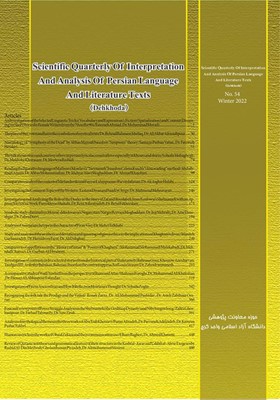Foucault's viewpoint of Power Struggle Analysis in the Shahnameh (the Goshtasp Dynasty) and Nibelungen Song
Subject Areas : Persian language and literature texts
zahra Ghorbanipour
1
![]() ,
farhad tahmasbi
2
*
,
Sareh Zirak
3
,
farhad tahmasbi
2
*
,
Sareh Zirak
3
1 - PhD student, Department of Persian Language and Literature, Science and Research branch, Islamic Azad University, Tehran, Iran.
2 - Associate Professor, Department of Persian Language and Literature, Islamshahr branch, Islamic Azad University, Islamshahr, Iran.
3 - Assistant Professor, Department of Persian Language and Literature, Science and Research branch, Islamic Azad University, Tehran, Iran.
Keywords: Goshtasp dynasty, Discourse, Nibelungen Song, Power struggle, Foucault,
Abstract :
Based on Foucault’s viewpoint, Power dominates all mechanisms of social exchange and it is linked to truth. Power in every society or period produces certain discourses as truth. According to Foucault's holistic plan for power, it is power that monitors, tames, normalizes, and identifies the human.The process of power, including discourse power, Bio power, and disciplinary discourse (Genealogy), monitors the least detailed subject’s behavior. Also, there are discourses in the time and place that create conflict atmosphere and semantic disputes (Archeology). Meanwhile, this study duo to the infrastructures, signifiers, and discursive functions, especially power discourse analyzes and compares the two texts to understand how power discourse and its proportions produce and the role of man. The research method is descriptive and comparative which are indicating that in the story of Goshtasp the dominant discourses are religious-political identities, political identities, and Iranian king identity. On the other hand, in the Nibelungen Song there are religious - political identity, political identities, German king identities and class identity. In conclusion, the religious - political identity discourse with two signifiers (holy and magic), have found a dominance and influence on the others discourse identity. Goshtasp and Kriemhilde are not normalized by power, but they are the powerful and knowledgeable characters, and combine the ideas of other characters with their own. Esfandiari and Siegfried were not normalized by power relation, but they adjust to the prevailing relations later.
کتابها
اسمارت، بری (1385) میشل فوکو، ترجمۀ لیلا جوافشانی و حسن چاوشیان، تهران: اختران.
دریفوس، هیوبرت و رابینو، پل (1379) فراسوی ساختارگرایی و هرمنوتیک، ترجمۀ حسین بشیریه، تهران: نی.
رازی، نجمالدین (1366) مرصادالعباد، تهران: علمی و فرهنگی.
سرود نیبلونگن (1381) ترجمۀ اسماعیل سعادت، تهران: سروش.
فردوسی، ابوالقاسم (1386) شاهنامه، به کوشش سعید حمیدیان، تهران: قطره.
فوکو، میشل (1378) مراقبت و تنبیه (تولد زندان)، ترجمۀ نیکو سرخوش و افشین جهاندیده، تهران: نی.
فوکو، میشل (1387) دانش و قدرت، ترجمۀ محمد ضیمران، تهران: هرمس.
قربانیپور، زهرا (1394) کتابشناسی فردوسی و شاهنامه از سال 1357 تا سال 1387، تهران: سوره مهر.
کاستلز، امانویل (1380) عصر اطلاعات: قدرت هویت، ترجمۀ حسن چاوشیان، تهران: طرح نو.
کچویان، حسین (1382) فوکو و دیرینهشناسی دانش، تهران: انتشارات دانشگاه تهران.
کوک، جاناتان (1385) گفتمان، در دانشنامۀ نظریههای ادبی معاصر به سرپرستی ایرنا ریما مکاریک، ترجمۀ مهران مهاجر و محمد نبوی، تهران: آگه.
میلز، سارا (1382) گفتمان، ترجمۀ فتاح محمدی، زنجان: هزاره.
مقالات
ارمی اول، سیما. (1391). بررسی روابط قدرت در داستان کیخسرو بر اساس دیدگاه فوکو. پژوهشهای ادبی، 9(38)، 34-9. Dor:20.1001.1.17352932.1391.9.38.5.
خاتمی، احمد، امنخانی، عیسی، علی، منا مددی. (1388). نگاهی به چرایی بازگشت ادبی از منظر نظریّۀ گفتمان فوکو. تاریخ ادبیات، 1(1)، 73ـ88.
صفیئی، کامبیز. (1395). بررسی عناصر مشترک در شاهنامه و سرود نیبلونگن. ادبیات عرفانی و اسطوره شناختی، 12(42)، 153-182. Dor:20.1001.1.20084420.1395.12.42.5.8.
_||_Books
Castells, Emmanuel (2001) Information Age: The Power of Identity, translated by Hassan Chavoshian, Tehran: Tarhe No.
Cook, Jonathan (2006) Discourse, in the Encyclopedia of Contemporary Literary Theories under the supervision of Irena Rima Makarik, translated by Mehran Mohajer and Mohammad Nabavi, Tehran: Agah.
Dreyfus, Hubert and Rabino, Paul (2000) Beyond Structuralism and Hermeneutics, translated by Hossein Bashirieh, Tehran: Ney.
Ferdowsi, Abulqasem (2007) Shahnameh, by the efforts of Saeed Hamidian, Tehran: Ghatre.
Foucault, Michel (1999) Care and Punishment (The Birth of Prison), translated by Niko Sarkhosh and Afshin Jahandideh, Tehran: Ney.
Foucault, Michel (2008) Knowledge and power, translated by Mohammad Zimran, Tehran: Hermes.
Ghorbanipour, Zahra (2014) Ferdowsi and Shahnameh bibliography from 1357 to 1387, Tehran: Soore Mehr.
Kechuyan, Hossein (2012) Foucault and Paleontology of Knowledge, Tehran: Tehran University Press.
Mills, Sara (2012) Dikhman, translated by Fatah Mohammadi, Zanjan: Hazara.
Nibelungen Hymn (2002) translated by Ismail Saadat, Tehran: Soroush.
Razi, Najm aldin (1987) Mursad al-Abad, Tehran: Elmifarhangi.
Smart, Barry (2006) Michel Foucault, translated by Leila Javafshani and Hassan Chavoshian, Tehran: Akhtaran.
Articles
Erami avval, S .(2013). The Analysis of power relations in the Keikhosrow Story Based on Foucault's view. LIRE, 9 (38) ,9-34. Dor:20.1001.1.17352932.1391.9.38.5.
Khatami, Ahmed, Amankhani, Isa, Ali, Mona Madadi. (2009). A look at the reason of literary return from the perspective of Foucault's discourse theory. Literature History, 1(1), 88-73.
Safiee, K. (2016). Studying the Common Themes in Nibelungenlied and Shāhnāmeh. journal of mytho-mystic literature, 12(42), 153-182. Dor:20.1001.1.20 084420.1395.12.42.5.8.

